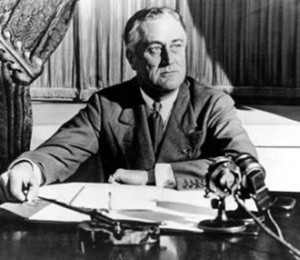
Seventy-one years ago this week, U.S. President Franklin Roosevelt articulated four fundamental rights that he believed all peoples should enjoy. The Four Freedoms, said FDR, should be goals for every post-World War II society: freedom of speech, freedom of worship, freedom from want, and freedom from fear.
His analysis was the hallmark of that year’s state-of-the-union address–and later, of the Atlantic Charter forged with British Prime Minister Winston Churchill.
So perfectly had Roosevelt captured the U.S. public consensus that the Four Freedoms became the subject of an iconic series of paintings by Norman Rockwell, the most popular commercial artist of the mid-20th century. Rockwell’s artwork, which first appeared in consecutive issues of The Saturday Evening Post, made each of the four ideals seem like accomplished facts of American life.
Today, no U.S. politician would openly reject the first two of these–why, freedom of speech and freedom of worship are enshrined in the Constitution! But what about the last two–freedom from want and freedom from fear?
Forget about it. Instead, we are told we should want individual liberty–i.e., the right to be hungry, lonely, and poor if you’re not one of the fortunate few. And freedom from fear? Why, there’s nothing to fear but unemployment, sickness, and discrimination. Best to change the subject…particularly if you are a politician.
Don’t expect the GOP presidential candidates to mention the Four Freedoms as they court voters in New Hampshire. They never will. But what about Obama? We should only be so lucky as to have a president who forcefully articulates ideals that seemed like accomplished facts a mere 71 years ago.
